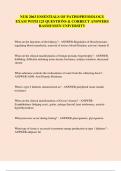NUR 2063 ESSENTIALS OF PATHOPHYSIOLOGY
EXAM WITH 125 QUESTIONS & CORRECT ANSWERS
RASMUSSEN UNIVERSITY
What are the functions of the kidneys? - ANSWER-Regulation of blood pressure;
regulating blood osmolarity; removal of toxins; blood filtration; activate vitamin D
What are the clinical manifestations of benign prostatic hypertrophy? - ANSWER-
dribbling; difficulty initiating urine stream; hesitancy; urinary retention, decreased
stream
What substance controls the reabsorption of water from the collecting ducts? -
ANSWER-ADH- Anti Diuretic Hormone
What is type 2 diabetes characterized as? - ANSWER-peripheral tissue insulin
resistance
What are the clinical manifestations of Graves' disease? - ANSWER-
Exophthalmos (bulging eyes), goiter, enlarge thyroid, heat intolerance, anxiety-
hyperthyroidism
What processes occur during fasting? - ANSWER-glucogenesis; glycogenesis
What type of tissue is accessed to promote energy production in type 1 diabetes? -
ANSWER-adipose/ fat
, What are the clinical manifestations of hypothyroidism? - ANSWER-myxedema,
fatigue, cold sensitivity, constipation, weight gain
What are the clinical manifestations of hyperthyroidism? - ANSWER-Goiter,
fatigue, weight loss, infertility, memory loss, hair loss, muscle pain
What are the clinical manifestation of hyper para thyroidism? - ANSWER-fatigue,
body aches, bone pain, depression, headaches, memory loss
What are the clinical manifestations of hypo para thyroidism? - ANSWER-
numbness, tetany, parathesis, muscle spasms
What are the clinical manifestations of ketoacidosis? - ANSWER-fruity breath,
drowsiness, nausea, thirst, confusion, lethargy, vomiting
What mechanisms control hormone release and regulation? - ANSWER-negative
feedback loop
What hormones are released by the anterior pituitary gland? - ANSWER-Growth
Hormone, prolactin, follicle stimulating hormone, thyroid stimulating hormone,
LH, ACTH and endorphins
What is diabetes insipidus? - ANSWER-a disorder caused by inadequate amounts
of ADH which causes excessive water loss
clinical manifestations of diabetes insipidus - ANSWER-polyuria, nocturia,
continuous thirst, and polydipsia




